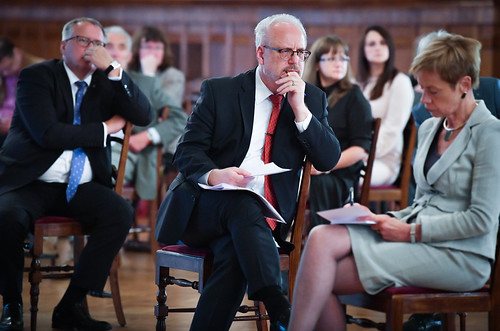On 24 July President of Latvia Egils Levits had invited historians, researchers, linguists, representatives of Latvian historical land and culture space non-governmental organisations, experts of the field and opinion leaders to discuss the need for the Latvian lands draft law initiated by the President of Latvia and the objectives thereof, as well as the sustainability and development plan for Latvian historical lands and culture spaces. The Latvian historical lands map created by economic geographer Jānis Turlajs and Guntis Zemītis and Ilmārs Mežs was presented to the participants.
When opening the working seminar, President of Latvia Egils Levits said: “The topic of our discussion today is simultaneously pertinent to two interrelated fundamental directions of the state of Latvia – democracy and identity. Both are a part of the foundations of Latvia. Today we will focus on the draft law on Latvian historical lands, which will strengthen both democracy and identity. This draft law is part of my response to the initial shortcomings of the Law on the Administrative Territorial Reform, as this reforms cannot be merely a technically engineered solution. It needs to include culture, affiliation, language, vernacular and dialect, as well as our perception of the world around us. Therefore, this draft law on the Latvian historical lands is an improvement to this reform making it more full-bodied and comprehensive. I would say that this law is of a constitutional, judicial nature, aiming to not only recognise the existence of the historical lands, but also promote their development.”
The participants voiced various proposals for the draft law and in general regarding the sustainability and development of the Latvian historical lands and culture spaces. For example, as regards development, cooperation among local communities, as well as cross-border cooperation ought to be strengthened, and the academic study of historical lands and culture spaces should also be promoted. In turn, the draft law initiated by the President of Latvia should establish responsibility of local governments in regard to historical land, culture space and identity issues and also establish a mechanism for the state to support the development of the existing lands and culture spaces. Furthermore, the state should have an interest in creating new culture spaces, because there are currently many undefined culture spaces with a special identity in Latvia.
Overall the participants showed strong support for the draft law being elaborated, which according to Arvils Ašeradens, Chair of the Education, Culture and Science Committee of the Saeima, “is a strong signal that we can go in-depth in the study of the Latvian identity”. Ašeradens also pointed out that “in the course of drafting the administrative territorial reform it has already become clear that Latvia’s economic political space differs significantly from its cultural historical space, thus creating many splitting issues, the resolution of which is time-consuming”.
At the conclusion of the discussion the President of Latvia acknowledged: “I thank you for your contribution to this discussion. It was extremely valuable and enriching for me and everyone here to better understand our state and our nation. The Latvian historical lands are a constitutional term denoting two dimensions – the cultural and the political, and therefore it requires careful examination. In turn, cultural and identity issues are based on internal impulses arising out of human nature and the need to self-identify and express ourselves through specific behaviour. We cannot create identity artificially if it does not exist within the people. It may have faded and weakened, but the state and society can externally encourage it (or quite the opposite – suppress it) rather than creating it artificially. I urge you to find this spark of parish, city, land, state, European and world identity within yourselves and to express yourselves respectively on each of these levels.”
The President of Latvia plans to submit the legislative initiative regarding Latvian cultural historical lands in September of this year.





